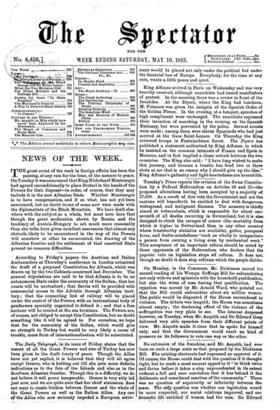No extension of the franchise, said Mr. Asquith, had ever
been on such a large scale as that proposed by the Dickinson Bill. The existing electorate had expressed no approval of it. Of course, the House could deal with the question if it thought right, but he made a most earnest appeal to it " to think twice and thrice before it takes a step unprecedented in its extent without a full and sure conviction that it has behind it the deliberate and considered sanction of the community." There was no question of superiority or inferiority between the sexes. The only question was whether our legislation would be more respected, our social relations improved, and our domestic life enriched it women had the vote. Sir Edward
Grey disputed the series of arguments used by anti-Suffragists, and particularly examined the industrial needs of women which would be met by the right to vote. He did not believe with Mr. Asquith that the relations of men and women would be degraded by political differences. He earnestly begged the House not to trifle with this question. The speech was as good a one in favour of woman suffrage as the friends of the cause could have wished, but the House rejected the second reading by a majority of forty-seven. Mr. Bonar Law and Mr. Balfour did not vote. Mr. Churchill voted against the Bill. It is now felt that woman suffrage is disposed of for the present Parliament.











































 Previous page
Previous page